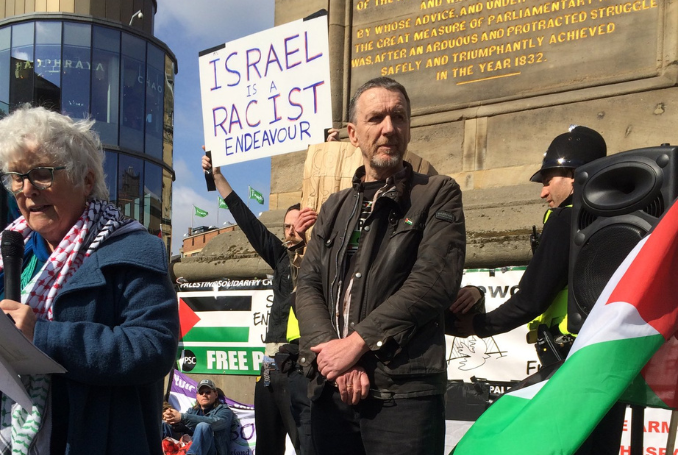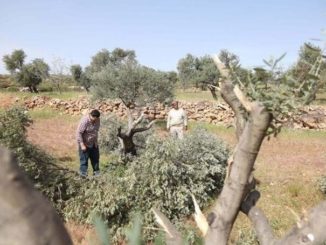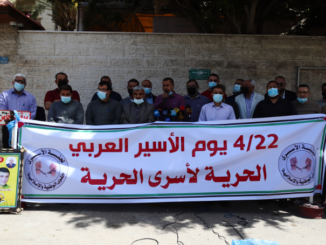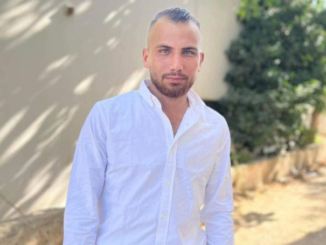
By David Harrop
Mick, a retired UK social worker, has embarked on his solo 3500 km trek as an act of Palestinian solidarity. He has been a long-time supporter of liberation from oppression and of challenging human rights issues.
Knowing that my friend Mick is currently undertaking a hike from the refugee camps of Calais to the Palestinian refugee camps of the West Bank, I was eager to read the recent article “Boycott Israel Trek; Don’t Spring Break in an Apartheid State”, written by Nadine Bahour in Mondoweiss.
This article reports that Harvard students are being invited to trek through Israel during their university vacations, whilst seemingly side-stepping any consideration of the continuing Palestinian occupation. Outwardly, this appears to be yet another manifestation of the ongoing process of Hasbara; a process from the Ministry of strategic affairs that seeks to shape narratives and counter-propagandize any pro-Palestinian narrative.
In contrast, Mick, a retired UK social worker, has embarked on his solo 3500 km trek as an act of Palestinian solidarity. He has been a long-time supporter of liberation from oppression and of challenging human rights issues. He has previously visited the West Bank, often in autumn to volunteer with the annual olive harvest, where his 2-meter plus frame is a welcome addition when reaching the uppermost branches!
As a lifelong trade unionist and officer, he has contacted many international union colleagues on his route and is eager to share his story with international comrades. He will also be happy to accept any acts of generosity such as a bed, a shower, or a meal that might present themselves on the way.
He is hoping that from time to time he will have the company of traveling companions who might fall in step with him. He has already experienced hot sunny days as well as wet and cold days and has experienced solidarity, hospitality, and support.
Obviously, the separation walls won’t fall because of this walk, nor will the settlements or checkpoints be dismantled. The prison gates won’t burst open, nor will Palestinian children be allowed to grow up liberated and in freedom, but the expedition is yet a further action that is undertaken in protest, and to raise awareness of these continuing human rights abuses.
Mick Bowman, a retired UK social worker, has embarked on his solo 3500 km trek as an act of Palestinian solidarity.
Mick Bowman, a retired UK social worker, has embarked on his solo 3500 km trek as an act of #SolidarityWithPalestinianPeople . pic.twitter.com/OqPW3gr1A0
— The Palestine Chronicle (@PalestineChron) May 24, 2023
When challenging overwhelming armed oppression, the nature of protest needs to be inventive and needs to take an approach that isn’t head-on. In both Calais and Palestine, the continued compliance or inaction of governments means that more nuanced and creative actions which are continuously being undertaken by groups and individuals become necessary to protest, raise awareness and express solidarity.
Evolution tells us that the process of change is inexorable. Knowing this, we need to struggle for the kind of change that accords with the common values of human justice and liberation and use all means to achieve this.
What we know from the decline of the British Empire to the break-up of the Soviet Union, to the end of South African apartheid, is that oppressive regimes can and do eventually end. We know that the deaths of Trayvon Martin and George Floyd have become the catalysts for the global BLM movement to challenge state brutality when reactions of anger metamorphize into responses of action with a belief for a new order.
Within this, a multiplicity of small acts can eventually contribute to the butterfly effect. Oppressive regimes have a power that is founded upon military, economic, and political control. They can only be challenged by humanitarian responses which are informed by principles of generosity, truth, awareness, and compassion.
Arguably it is the collective actions of grassroots individuals and movements which are the agents of change. They need to have the capacity to think outside of the box and to be able to collectively challenge narratives that normalize oppression.
This walk will raise awareness as another action to hopefully mobilize and engage popular imagination about the continuing occupation. Hence it is not only incumbent on the walk to be undertaken and completed, but equally for the word to be spread about it, to amass awareness about one man’s actions to make a statement of solidarity about the transgenerational oppression of Palestinians.
It’s the kind of action that reminds you that the process of caring about people is always a verb i.e., you need to do something for it to happen. It is the accumulation of many such small actions which contribute to the potential for larger freedoms.
Whilst the occupation is militarized and weaponized, it remains incumbent on those who seek to oppose to explore unarmed methods to challenge oppression. To commit the first year of your retirement to walk across Europe as an act of solidarity remains an act of determined protest against the ongoing abuse of human rights and of injustice.
Unlike the participants of the Harvard University trekking across Israel, this has not been laid on a plate by a government that is seeking to use eco-tourism to wash its own image. Rather this is one person’s power of awareness and determination to express their solidarity in the process of seeking justice.

– David Harrop is an independent UK-registered social worker and co-founder of Palestine UK Social Work Network (PALUK) in 2011. Contact the author at his address email: harrop_david@yahoo.co.uk. He contributed this article to The Palestine Chronicle.







